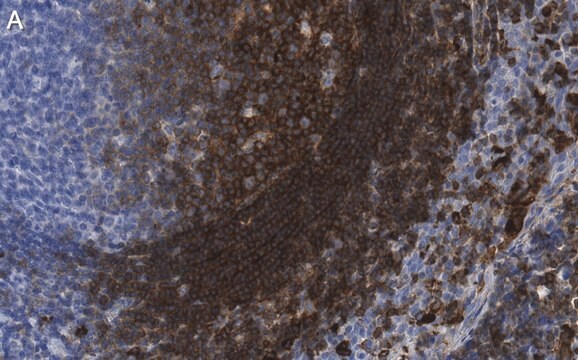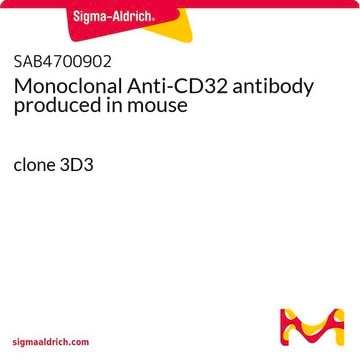CWA-1085
Anti-Mouse CD16/CD32 (93) ColorWheel® Dye-Ready mAb
for use with ColorWheel® Dyes (Required, (Sold Separately))
Synonym(s):
Low affinity immunoglobulin gamma Fc region receptor III/II
About This Item
Recommended Products
biological source
rat
Quality Level
antibody form
purified antibody
antibody product type
primary antibodies
clone
93, monoclonal
product line
ColorWheel®
form
lyophilized
mol wt
calculated mol wt 30.04 and 36.95 kDa
purified by
using Protein A
species reactivity
mouse
species reactivity (predicted by homology)
human
packaging
antibody small pack of 25 μL
greener alternative product characteristics
Waste Prevention
Designing Safer Chemicals
Design for Energy Efficiency
Learn more about the Principles of Green Chemistry.
sustainability
Greener Alternative Product
technique(s)
flow cytometry: suitable
isotype
IgG2aκ
epitope sequence
Unknown
Protein ID accession no.
UniProt accession no.
compatibility
for use with ColorWheel® Dyes (Required, (Sold Separately))
greener alternative category
, Aligned
shipped in
ambient
storage temp.
2-8°C
target post-translational modification
unmodified
General description
Specificity
Immunogen
Application
Evaluated by Flow Cytometry in BALB/c mouse splenocytes.
Flow Cytometry Analysis: Staining of one million BALB/c mouse splenocytes was performed using 5 μL of a 1:1 mixture of Cat. No. CWA-1085, Anti-Mouse CD16/CD32 (93) ColorWheel® Dye-Ready mAb and Cat. No. CWDS-PE ColorWheel® Antibody-Ready Phycoerythrin (PE) Dye or an equivalent amount of PE-conjugated Rat IgG2a isotype control.
Note: Actual optimal working dilutions must be determined by end user as specimens, and experimental conditions may vary with the end user
Compatibility
Target description
Physical form
Reconstitution
Storage and Stability
Legal Information
Disclaimer
Not finding the right product?
Try our Product Selector Tool.
required but not provided
Storage Class Code
11 - Combustible Solids
WGK
WGK 2
Flash Point(F)
Not applicable
Flash Point(C)
Not applicable
Choose from one of the most recent versions:
Certificates of Analysis (COA)
Don't see the Right Version?
If you require a particular version, you can look up a specific certificate by the Lot or Batch number.
Already Own This Product?
Find documentation for the products that you have recently purchased in the Document Library.
Our team of scientists has experience in all areas of research including Life Science, Material Science, Chemical Synthesis, Chromatography, Analytical and many others.
Contact Technical Service







![(4R,4′R,5S,5′S)-2,2′-Cyclopropylidenebis[4,5-dihydro-4,5-diphenyloxazole] ≥95%](/deepweb/assets/sigmaaldrich/product/structures/104/825/126fc1d0-0369-45da-95f0-5f745b5cf8fa/640/126fc1d0-0369-45da-95f0-5f745b5cf8fa.png)
